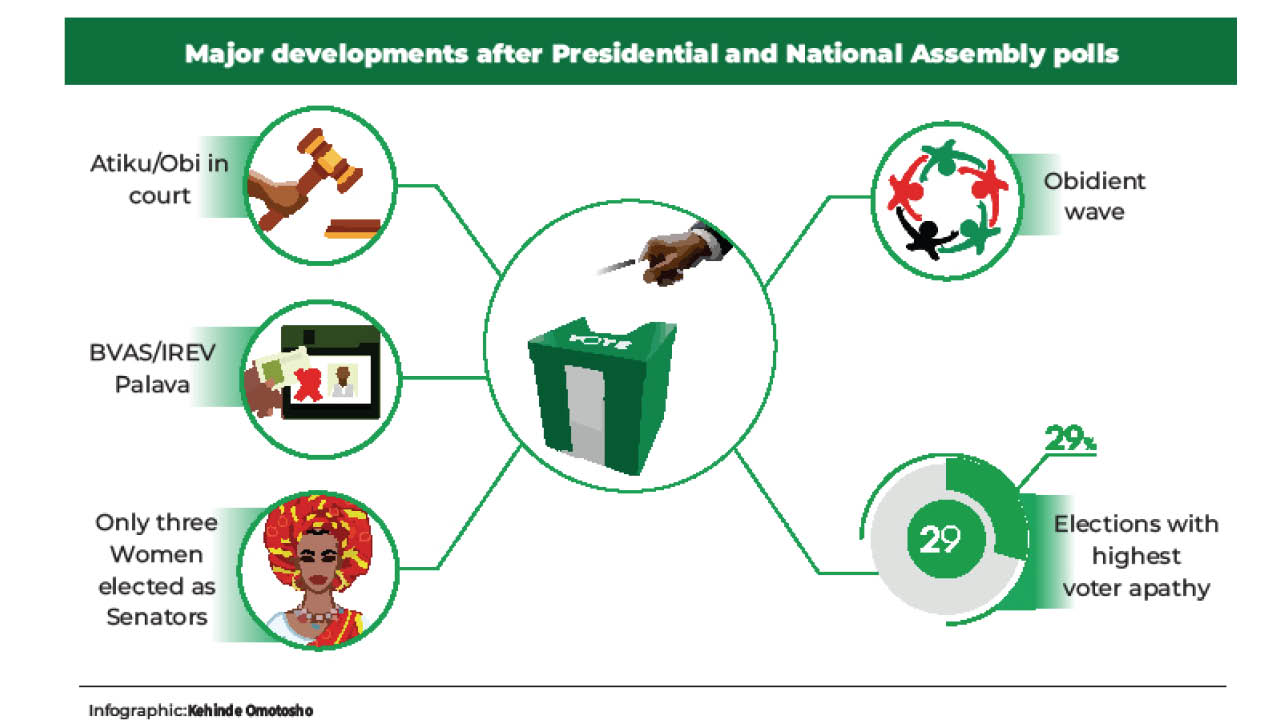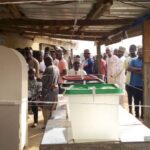The presidential and National Assembly elections may have come and gone with Asiwaju Bola Ahmed Tinubu declared winner of the presidential poll, but it has brought key issues and notable developments. Daily Trust on Sunday compiled five major issues and developments arising from the elections.
Atiku, Obi challenge outcome of result in court
The presidential candidate of Labour Party (LP), Mr Peter Obi, and his Peoples Democratic Party (PDP0, counterpart, Alhaji Atiku Abubakar, have rejected the outcome of the February 25 presidential elections and are now in court to challenge the results.
While Obi is claiming that he won the election and would explore all legal and peaceful means to prove it, Atiku also noted that “the processes and outcome of the elections of last Saturday were grossly flawed in every material, and as such, must be challenged.”
Both Atiku and Obi have affirmed their intentions to challenge the outcome of the results in their first press conferences after the elections.
However, the declared winner of the presidential election, Mr Tinubu, who had earlier in his victory speech extended a hand of fellowship to his challengers, expressed readiness to meet them in court to defend his mandate.
Tinubu of the All Progressives Congress (APC) secured 8,794,726 votes while Atiku Abubakar of the PDP had the second-highest figure with 6,984,52 and Obi came third with 6,101,533 votes.
BVAS, IReV ‘palava’
One of the new technological innovations in the Electoral Act is the Bimodal Voter Accreditation System (BVAS), which was deployed across polling units.
The BVAS is an electronic device designed to read a permanent voter’s card (PVC) and authenticate voters’ using fingerprints in order to prove that a voter is eligible to vote at a particular polling unit.
It is a technological innovation created to intensify the transparency of election results and boost public trust in election outcomes.
The usage of BVAS entails either scanning the barcode or QR code on the PVC/voter’s register, entering the last six digits of the Voter Identity Number (VIN) or typing in the last name of the voter by the assistant presiding officer (APO) to verify and authenticate the voter.
INEC states that these technologies are solutions to some of the weaknesses in Nigeria’s electoral management, namely, falsification of votes at polling units, falsification of number of accredited voters, collation of false results, mutilation of results and computational errors, swapping of results sheets, forging of results sheets, snatching and destruction of results sheets, obtaining declaration and return involuntarily, making declaration and return while result collation is still in progress and poor recordkeeping.
However, the BVAS, in the aftermath of the elections, generated different reactions as the candidates of the LP, PDP and APC have been granted permission to inspect election data on the BVAS machine.
Consequently, an Appeal Court sitting in Abuja, on Wednesday granted the Independent National Electoral Commission (INEC) its request to reconfigure the BVAS ahead of the forthcoming governorship and state assembly elections.
The Appeal Court also granted a request by the president-elect, Tinubu, to equally access the BVAS and sensitive materials used by INEC during the presidential poll.
The court also refused to vary the permission earlier granted the PDP and Labour Party to inspect materials used by the commission in the conduct of the February 25 presidential election.
The panel ordered INEC to upload the data on the BVAS machines to the back-end server and make certified true copies of the data to the respondents.
As a result of that judgement, INEC subsequently announced the postponement of the governorship and National Assembly elections from March 11 to 18.
In the same vein, INEC promised to upload election results of the 2023 general elections real time on its Results Viewing Portal (IReV).
However, the commission failed to upload the results to the IReV, thereby resulting to manual transmission of results, therefore, casting suspicion and doubts on the minds of the electorate, politicians and election observers who believe that the process was not transparent.
The Independent National Electoral Commission has taken full responsibility for the problems associated with the delay in uploading most results of the general elections to its IReV.
Consequently, Festus Okoye, INEC national commissioner and chairman, Information and Voter Education Committee, in a statement noted that the commission regretted the distress the situation in the IReV caused candidates, political parties and the electorate.
Okoye assured Nigerians that results from the polling units, copies of which were issued to political parties, were safe on both the BVAS and the IReV portal and would not be tampered with.
Only 3 females emerge senators-elect
Daily Trust on Sunday reports that only three females are among the 101 senators-elect so far issued certificates of return by the INEC.
The three successful female senators-elect are Banigo Ipalibo Harry (Rivers West) of the PDP, Kingibe Ireti Heeba (FCT) of the Labour Party and Adebule Idiat Oluranti of the APC (Lagos West).
The commission said it was able to conclude and make returns in 101 senatorial districts after the February 25 presidential and National Assembly elections, while eight were declared inconclusive.
That of Enugu East was, however, due to the assassination of the LP senatorial candidate two days to the election.
The Nigerian Senate is composed of 109 senators.
There are also high indications that Nigeria will end up with only these three female senators as the districts where INEC is to conduct by-elections are not likely to produce any female senator.
The outstanding districts are Enugu East, Plateau Central, Kebbi Central, Yobe South, Zamfara Central, as well as all the three seats in Sokoto State.
The ‘Obidient’ wave
The just polls show that the Labour Party is gradually gathering momentum into mainstream politics as the party got six Senate and 34 House of Representatives seats.
In fact, the party’s supporters, who are called ‘Obidients,’ a coinage from the presidential candidate of the party, Peter Obi, came out en masse to vote their various candidates, which resulted in the defeat of Asiwaju Bola Ahmed Tinubu in his home state of Lagos.
The result came as a surprise to many political observers owing to the fact that Tinubu is considered as the ‘godfather’ of Lagos politics.
Compared to its phenomenal stride in the 2023 elections, the LP did not get a single seat in the 2019 National Assembly elections.
Four years ago, out of the 360 seats in the House, the APC won the majority seats with over 211 members and the PDP got over 111 members. The other seats were shared amongst the smaller parties.
Peter Obi, a former Anambra State governor, is changing the trend in Nigeria’s political landscape and leading the new third force as he was able to galvanise the support of millions of youths, especially in southern Nigeria, in less than a year since he moved to the LP from the PDP.
He won 12 states, including Lagos and other former strongholds of the two previously dominant parties with a total of 6,101,533 votes.
Highest voter apathy in history of elections since 1999
The results from the presidential poll showed the lowest in voter turnout rate in the country’s history of presidential elections since the return of Democracy in 1999.
About 93.5million Nigerians registered to vote, but only about 25 million of them showed up to vote. This means that 2 out of 10 registered voters were at polling booths to vote.
Observations by Daily Trust on Sunday show that two reasons may account for the low voter turnout.
The Bimodal Voter Accreditation System played a key role as it was effective in detecting, rooting out and cleaning the electoral process of voting fraud, such as over-voting, a situation where the total number of vote cast exceeds the total number of registered voters and voting by proxy, a setting where unclaimed and uncollected permanent voters’ cards were used by electoral officers and political party agents in inflating vote counts.
Technical glitches and voter intimidation were also factors.
There were cases where voters showed up at the polling booths but were unable to exercise their franchise. Some were prevented by pseudo technical glitches, logistics issues, such as delay in the arrival of voting materials, while for others, it was a pure case of intimidation and violence.

 Join Daily Trust WhatsApp Community For Quick Access To News and Happenings Around You.
Join Daily Trust WhatsApp Community For Quick Access To News and Happenings Around You.


